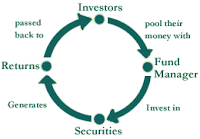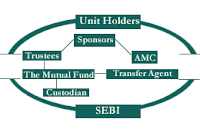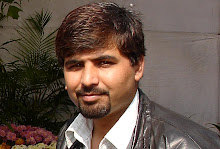Structure of Mutual Funds:
In India mutual funds function as trust created under the Indian Trust Act, 1882. There are three layers of mutual fund in India. (i) Sponsors (ii) Trustee and (iii) Asset Management Company. Sponsors work as Promoters of the company. They take responsibility of starting mutual fund business. Sponsors contribute initial capital (40% of net worth of AMC) and appoint Trustees and Board of Trustees. Board of Trustees act as guardians of investors and ensure that money invested by investors is used according to the objective of the scheme. Asset Management Company is the public face of fund management business. Sponsors and Trustees together form AMC and appoint Fund Manager. Fund manager with help of fund management team makes all investment decisions.

How safe is investing in Mutual Funds?
In India mutual funds function as trusts. The sponsor of the fund appoints Board of Trustees who act as guardians of investorï's money. The board or Trustee Company, as an independent body acts as protector of the unit holderï's money. These trustees ensure that investorï's interest is safeguarded and that the AMCï's operations and Fund Managerï's actions are along the professional lines. To ensure independence of Board of Trustees, SEBI mandates a minimum of two-third independent directors on the board of Trustee Company.
Apart from Trustees, the entire mutual fund industry functions under the preview of SEBI. This structure and stringent guidance make investing in mutual funds safe and easy. Fund Managers also have to function within the broad framework and rules & regulations designed by AMC.
Investing in Mutual Fund: Mutual funds are considered as favorable investment vehicle for individual investors particularly for investors who have limited resources available in terms of capital and ability to carry out their investment decisions.
Advantages of investing in mutual funds:
· Portfolio Diversification: ‘Do not Put All Eggs in One Basket’. Mutual Fund is the best vehicle to apply this proverb in practical life as a diversified equity scheme invests across multiple sectors and stocks. A typical diversified equity scheme holds around 30 to 50 stocks in portfolio so even if few stocks or sectors do not perform well investor’s money can get protected.
· Diversification of Risk: Whatever is your investment amount, that amount gets diversified across multiple stocks held by fund manager.
· Liquidity: Mutual Fund investment provides high degree of liquidity as investors can sell units to the fund if scheme is open ended or in the stock market if scheme is close ended. Investor normally gets money credited in bank account or receives cheque within three working days of redemption.
· Professional Management and Expertise: Through mutual fund, individual investor can take advantage of expertise of fund manager and his fund management and research team. This kind of detailed research work is not possible to do for an individual investor. Fund managers are highly qualified and experienced in their field which allows investors to take advantage of their expertise.
· Convenience: Mutual Funds score over other products in terms of convenience and ease. What investors require is to fill an application form and attach a copy of PAN card and cheque.
· Tax Advantage: Investment made in mutual funds offer multiple tax advantages and prove tax efficient. There is no long term capital gain in equity schemes if an investor stays invested for one year. Dividends are also tax free in hands of investors in equity schemes.
Different Types of schemes available under mutual funds:
Equity Mutual Funds:
These types of funds invest investorï's money in equity shares. This funds work on basic concept of ï'High Risk ï' High Returnï'. Among all categories of products this type of funds have potential to generate highest return but investors have to face highest risk. As money gets invested in equity market, the performance of these type of funds largely depend on equity markets but fund managers due to their expertise and research tend to outperform benchmark indices over a long investment horizon.
Among equity funds, fund managers adopt different investment strategies and accordingly schemes can be divided. There can be different schemes like value funds, growth funds, sector funds, contra fund etc depending on the style of investment.
Equity mutual funds are most suited for investment horizon of three years and above as in short term equity markets remain highly volatile. Within equity mutual fund basket there are number of options available to investors to choose from according to his risk taking capability. Equity funds can be broadly classified into Large Cap Funds, Mid Cap Funds and Blend Funds. Large Cap funds invest in bluechip companies which offer stable return with low volatility.
Mid Cap funds as name suggest try to generate higher return by investing in small & mid cap companies which offer higher growth potential.
Blend funds do not follow any market cap bias and create portfolio from any market universe.
Income Funds:
These are the debt category of funds. They invest in fixed income generating instruments and that is why they are broadly called income funds. They invest in large universe of debt instruments like money market instruments, T bill, corporate bonds, government securities etc.
The main objective of Income funds is to generate steady return at lower level of risk. Based on underlying assets and duration these funds can be classified in different categories like gilt funds and income funds. As name suggests gilt funds invest only in government securities where as income funds invest in corporate bonds and debentures along with G secs. As gilt funds invest only in G sec there is no default risk involved. Both Income funds and Gilt funds are mainly affected by changes in interest rates in the economy.
Liquid Funds:
These funds are normally used to park very short-term funds on a temporary basis. Investment horizon should ideally be from one day to three months. Investment is done in very short term debt instruments like inter bank call money market, T bills, Certificate of Deposits issued by government. As investment maturities are short, they are not vulnerable to interest rate risk.
As name suggests, liquidity level is very high as investor gets money credited in his/her account within 24 hours of redemption.
Equity Linked Saving Schemes (ELSS):
These schemes are similar to equity schemes with only difference being it comes with 3 year lock in period and provide Section 80 C benefit under income tax. By investing Rs.1 lakh in any of the ELSS scheme available, an investor can save tax by claiming deduction under Section 80 C. Like equity funds, ELSS also invests in equity shares and subject to risks associated with stock market.
Open End and Close End Funds:
This is another type of classification of schemes. An open end fund is the one that sells and repurchase units at all times. An investor can buy or sell units from fund itself at prevailing NAV.
In close end fund, only one time sale of fixed number of units are made and investor can purchase units during that specific period. Closed end funds do not allow investors to buy or sell units directly from the fund. However to provide liquidity, close ended funds do get listed on the stock exchange and trade at premium or discount to NAV based on investorï's perception about fund performance and other factors. The number of outstanding units of a close-ended fund does not vary on account of trading in the fundï's units on the exchange





